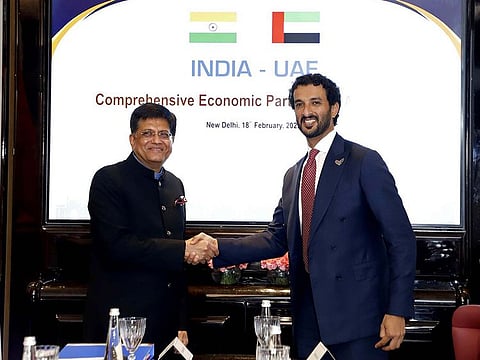UAE's CEPA deal with India goes live on May 1, Ministry of Economy sets up portal on trade deal
Businesses can access info on CEPA and other details - deal goes live on May 1

The UAE Ministry of Economy has launched a webpage for the Comprehensive Economic Partnership Agreement (CEPA) between UAE and India, providing UAE companies and investors instant info on the benefits provided by the deal.
UAE’s Minister of State for Foreign Trade, Dr. Thani bin Ahmed Al Zeyoudi said that the CEPA will come into effect on May 1. With CEPA in place, the volume of UAE-India non-oil trade is expected to touch $100 billion a year within next five years.
Al Zeyodi took to Twitter to make the announcement. He said, “Are you ready for a new era of opportunity? #IndiaUAECEPA comes into effect on May 1, reducing tariffs, removing barriers to trade to helping our exporters access the world’s sixth-largest economy.”
The deal will immediately allow a range of goods and services from both countries to receive import duty waivers, or a drastic reduction. In time, more categories will be added to the duty waiver portfolio.
According to Juma Al Kait, Assistant Undersecretary of International Trade Affairs, “The webpage - moec.gov.ae/en/cepa - provides all the necessary resources and relevant information to private sector stakeholders and companies in the UAE who are interested in enhancing their businesses and investment in India. It also gives them an overview of the trade and investment opportunities and features of this historic agreement.”
The Ministry of Economy’s launch of the webpage is part of the plan to 'operationalize' the UAE-India CEPA, with the aim of providing the private sector with the tools, knowledge, and information to 'deepen trade relations with India, which is the world's fifth largest economy'. These efforts will help increase the volume of UAE-India non-oil trade to USD 100 billion a year within next five years.
Details on all 18 chapters of CEPA
The Ministry of Finance portal provides detailed information on all 18 chapters of the CEPA and lists steps that companies in the UAE can adopt to forge or expand their business relationship with the Indian market. In addition, it provides details for each sector including tariff structures, rules of origin, differential treatment, customs procedures, digital trade, and SMEs, which will help entrepreneurs identify the rules and tariffs applicable to their businesses and product as well as the certificates that must be obtained to enter the Indian market under the new regulations.
The UAE-India CEPA is among the first of similar trade-focussed agreements both countries will sign with other key partners. UAE and Israel are expected to shortly announce theirs shortly.
The next steps
A team of experts have been appointed by the Ministry of Finance to respond to private sector and investor enquiries about CEPA and clarify its clauses, as well as to inform companies of several 'trade remedies' contained in the Agreement. These include a number of experts from the Abu Dhabi and Dubai Chambers and The Department of Economy and Tourism. Later, the Ministry will meet with state-owned enterprises, family business conglomerates and multinational companies to help them understand the details of the tariff reduction and removal – which covers 80% of products. Workshops will also be conducted to ensure every startup and corporation knows what to do to unlock the enormous opportunities presented by the CEPA.
Sign up for the Daily Briefing
Get the latest news and updates straight to your inbox



